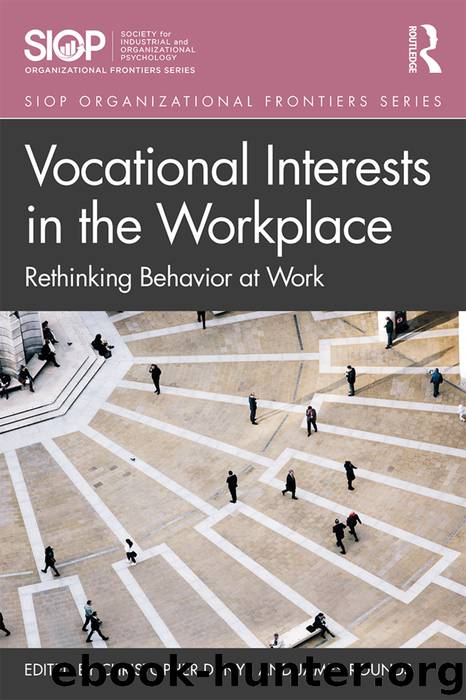Vocational Interests in the Workplace by Nye Christopher D.;Rounds James;

Author:Nye, Christopher D.;Rounds, James;
Language: eng
Format: epub
Publisher: Taylor & Francis (CAM)
Published: 2019-10-16T16:00:00+00:00
Proposition 9: Organizational practices that foster Individuation, such as opportunities for challenge and development, and managerial styles that emphasize employee participation and initiative, should be most effective at increasing work meaningfulness for those with E, R, I, and A interests.
Organizational Role in Fostering Meaningfulness Through Contribution
Because meaningful work via Contribution is about having a positive impact on others (Rosso et al., 2010), organizational strategies to promote perceptions of impact should increase employee access to meaningfulness. Based on the theorizing above, these strategies should be most useful for those with S, E, and C interests. Two specific practices for improving meaningful work via Contribution are relational job design and transformational leadership. First, research on relational job design—connecting employees with the impact that their work has on others (Grant, 2007)—shows that when employees have contact with, or receive information about, the beneficiaries of their work they experience greater perceptions of social impact (Grant, 2008; Grant et al., 2007). This idea is supported by research establishing that people are more likely to perceive the positive impact of their actions on others when they have clear and objective opportunities to benefit others through their work (Batson, 1998; Latane & Darley, 1970; Grant, 2007). Work designed to promote a positive sense of impact on others contributes to greater task significance, which is associated with more meaningful work (Grant, 2007, 2008). Organizations can play a role in helping employees see how their work is contributing to others through such strategies as providing employees with customer testimonials and customer profiles (Grant, 2011), or by encouraging employees to reflect—perhaps during performance reviews or other feedback sessions—about how their work has a positive impact on others (Cardador, 2014).
A second practice associated with employees’ increased sense of meaningfulness via Contribution is transformational leadership. Transformational leaders articulate a vision that makes employees more aware of, and attentive to, how their work benefits others (Colby, Sippola, & Phelps, 2001; Grant, 2012; Podolny et al., 2004). Motivating employees to transcend self-interest by highlighting how and why employees’ work has important consequences for others can help improve meaningfulness via Contribution.
Based on this evidence:
Download
This site does not store any files on its server. We only index and link to content provided by other sites. Please contact the content providers to delete copyright contents if any and email us, we'll remove relevant links or contents immediately.
| Conflict Resolution & Mediation | Human Resources & Personnel Management |
| Knowledge Capital | Outsourcing |
Bullshit Jobs by David Graeber(3826)
Radical Candor by Kim Scott(2578)
I Am Right, You Are Wrong by Edward De Bono(2338)
23:27 by H. L. Roberts(2139)
Nomadland by Jessica Bruder(1954)
Average Is Over by Tyler Cowen(1754)
The Conflict Resolution Phrase Book by Barbara Mitchell & Cornelia Gamlem(1644)
Out of Our Minds: Learning to Be Creative by Ken Robinson(1624)
High-Impact Interview Questions by Victoria A. Hoevemeyer(1611)
The Ideal Team Player by Patrick M. Lencioni(1562)
An Everyone Culture: Becoming a Deliberately Developmental Organization by Robert Kegan & Lisa Laskow Lahey(1526)
The Asshole Survival Guide by Robert I. Sutton(1502)
Automatic Society by Bernard Stiegler(1462)
Unleashed by Anne Morriss & Frances Frei(1421)
Who by Street Randy & Smart Geoff(1416)
Who Moved My Cheese?: An Amazing Way to Deal With Change in Your Work and in Your Life by Johnson Spencer(1416)
42 Rules of Employee Engagement by Susan Stamm(1396)
96 Great Interview Questions to Ask Before You Hire by Paul Falcone(1354)
The Power of Disability by Al Etmanski(1285)
